Hey, the book’s out. If you haven’t bought it yet, you should. If you have, you should write a (hopefully positive!) review of it on Goodreads or Amazon or both. I hope those of you who have a copy are enjoying it. Also, bookplates are finally (and slowly) rolling their way out to some of you over the next month.
About 15 years ago, a guy I sorta knew who worked in the sports media industry—a nice enough guy, kinda doltish in that works-in-the-sports-media-industry way—came to me with a most unusual flex. “You’re an Internet guy,” he said, more firmly establishing that we didn’t know each other well. “You’ll love this.”
He’d just gotten engaged the weekend before, he said, and it was so much easier than he thought it was going to be. Wanna know why? he asked me. Wanna know why? It was easy, he explained, because he simply typed “how to ask your girlfriend to marry you” into Google, cut-and-pasted the first result that came up, and then merely added in his girlfriend’s name. “It was beautiful,” he said. “She loved it. She ate it up.”
He had this self-satisfied, look-at-this-lifehack-I-just-figured-out look on his face, and I decided that if his girlfriend had really loved his proposal and had in fact “ate it up,” this couple may well be perfectly matched. Perhaps two people had never deserved each other more.
I used to tell people this story as a way to gently mock that dope and people like him, people who were so removed from the fundamental feeling of being alive that they would contract out the most important moments of their lives to an anonymous Web search rather than expend a modicum of effort. But as the years have gone along, I find him less an outlier than a canary in the coal mine—a sign that language was increasingly being used not to describe the wonders of the world in which we live, but to obscure and deny it.
Earlier this year, in the wake of the tragic shooting at Michigan State University, the Vanderbilt Peabody College of Education and Human Development sent out a release to its student body, letting everyone know that “we must reflect on the impact of such an event and take steps to ensure that we are doing our best to create a safe and inclusive environment for all” and that we must “come together as a community to reaffirm our commitment to caring for one another and promoting a culture of inclusivity on our campus. By doing so, we can honor the victims of this tragedy and work towards a safer, more compassionate future for all.” Noble sentiments, to be sure, except for one thing: They were, as discovered by the student newspaper, written by a ChatGPT bot. They were, in fact, the exact opposite of sentiments. In a moment that called for a shared humanity and communal mourning, a moment when you could look at your fellow person and reflect upon the precious sanctity of being alive, school administrators decided to ask a robot to impersonate human emotion rather than to open themselves up to expressing it themselves.
As we charge more headlong into an AI-era—and it does feel, with the constant, sometimes overheated battles over the technology, the artists strikes that in many ways are centered around this potential existential peril, with the sense that even people who are not particularly tapped into this sort of tech stuff are starting to understand AI’s possibilities in way that feels weirdly similar to when everybody got iPhones around 2008—I think it is worth remembering that AI is not, in fact, real. This is a strange thing to have to say out loud—”artificial” is right there in the name—but I kind of think it needs to be repeated as much as possible so that we do not forget it. To rely upon this technology, to use it as a foundational aspect of connecting with the outside world, is to deny one’s humanity, to contract out the difficulty and complexity of engaging with the outside world. It is, essentially, to give up.
I am not immune to the charms of playing around with the ChatGPT bot. One of my favorite games is to make it write press releases about imaginary jobs that I have been hired for.
That’s sort of fun, I won’t lie. (I also enjoy that the bot gets confused about my biography and just decides I’m from “New Athens, Illinois,” which is in fact a real place.)
Heck, maybe I’ll run for President.
See? Kinda fun! The problem, of course, is not only is none of this is real, it all exists solely on the impersonation of being real. We know what it sounds like when a sports team sends out a press release announcing a new general manager, and we know what sort of vague generalities consultants come up with when they attempt to craft a message for why someone should run for higher office. So a computer has taken all of that bullshit—and let us not pretend it is not, and has ever been, anything other than bullshit—and stirred it into a bland, palatable boilerplate that, if you’re not really paying attention, might just pass for real life. You can even get the bot to come up with 40 more empty reasons I should run for President.
Obviously, I have no business running for President. But with enough empty thoughts recycled over and over, and then with robots churning those empty thoughts and content-free wording into a stew that is vaguely familiar to the otherwise distracted, you can talk yourself into anything. And you can do it without saying anything at all.
After all, if you can make a case for me to run for President, you can make a case for anyone.
Again: Palatable, as long as you don’t read too closely, or think about it too hard. And trying to avoid “thinking about it too hard” is of course why people use AI in the first place. It’s certainly why corporations think they can get away with using AI to cut costs: They think we won’t notice, or that if we do notice, we won’t care. They think if the words sound familiar enough, it won’t matter how hollow they are. They think we’ll just eat it up.
I have long thought that, if bots ever came for my job, well, if I can’t outwrite a robot, maybe it’s probably time to find something else to do anyway. But the question is not whether I can outwrite a bot or not. I know I can do that. (At least I hope.) The question is whether people actually care. Not whether they care about my writing—I certainly have no expectations in that regard—but simply whether or not we will ultimately care enough to engage with human emotions anymore, from anyone. There is the real possibility that we’ve all been beaten down enough with automation and thoughtlessness already, with that sense that everything’s bullshit anyway, that the easiest thing to do is just accept it—to numb out. Your engagement proposal is recycled and meaningless; the emotions we want you to share with us after this tragedy are manufactured and empty; Jonah Hill is a unifying figure with the ability to bring diverse groups of people together.
It is not the computers that are the problem. It is how we choose to rely upon them. My AI worry is not that bots will enslave humanity and use our brains for fuel. It’s that if that were to happen, we’ll be fine with it. Maybe it already has.
Here is a numerical breakdown of all the things I wrote this week, in order of what I believe to be their quality.
Nine Can’t-Miss Games on the 2024 Schedule, MLB.com. As someone who plans his year around baseball more than he’d like to admit, this always comes in handy.
Please Let Shohei Play Somewhere Good, New York. I actually think the Mets would be really fun.
Ranking the 2023 All-Stars, MLB.com. Guaranteed to get me yelled at every year.
I Wrote the Power Rankings Again, MLB.com. But did not compile them!
PODCASTS
Grierson & Leitch, we each gave our six best movies of the first half of the year, one of the fun shows every year.
Seeing Red, we previewed the second half, if you can stomach it.
Waitin' Since Last Saturday, no show this week.
LONG STORY YOU SHOULD READ THIS MORNING … OF THE WEEK
“In Defense of Independent Opinion Journalism,” Jonathan Chait, New York. I think this piece sums up where I am politically very well.
Also, my friend and old New York colleague Robert Kolker, who wrote the great Lost Girls book about the Long Island murders, wrote about the victims in the wake of an arrest finally being made in that case yesterday.
ONGOING LETTER-WRITING PROJECT!
This is your reminder that if you write me a letter and put it in the mail, I will respond to it with a letter of my own, and send that letter right to you! It really happens! Hundreds of satisfied customers!
Write me at:
Will Leitch
P.O. Box 48
Athens GA 30603
CURRENTLY LISTENING TO
“Big Tall Man,” Liz Phair. In another of my Liz Phair modes, in case you forgot just how Gen-X I am.
Remember to listen to The Official Will Leitch Newsletter Spotify Playlist, featuring every song ever mentioned in this section.
Also, now there is an Official The Time Has Come Spotify Playlist.
The bad news is that William and I had a rainout during our annual trip to Busch Stadium last night. The good news is that now means we get two baseball games today.
Best,
Will



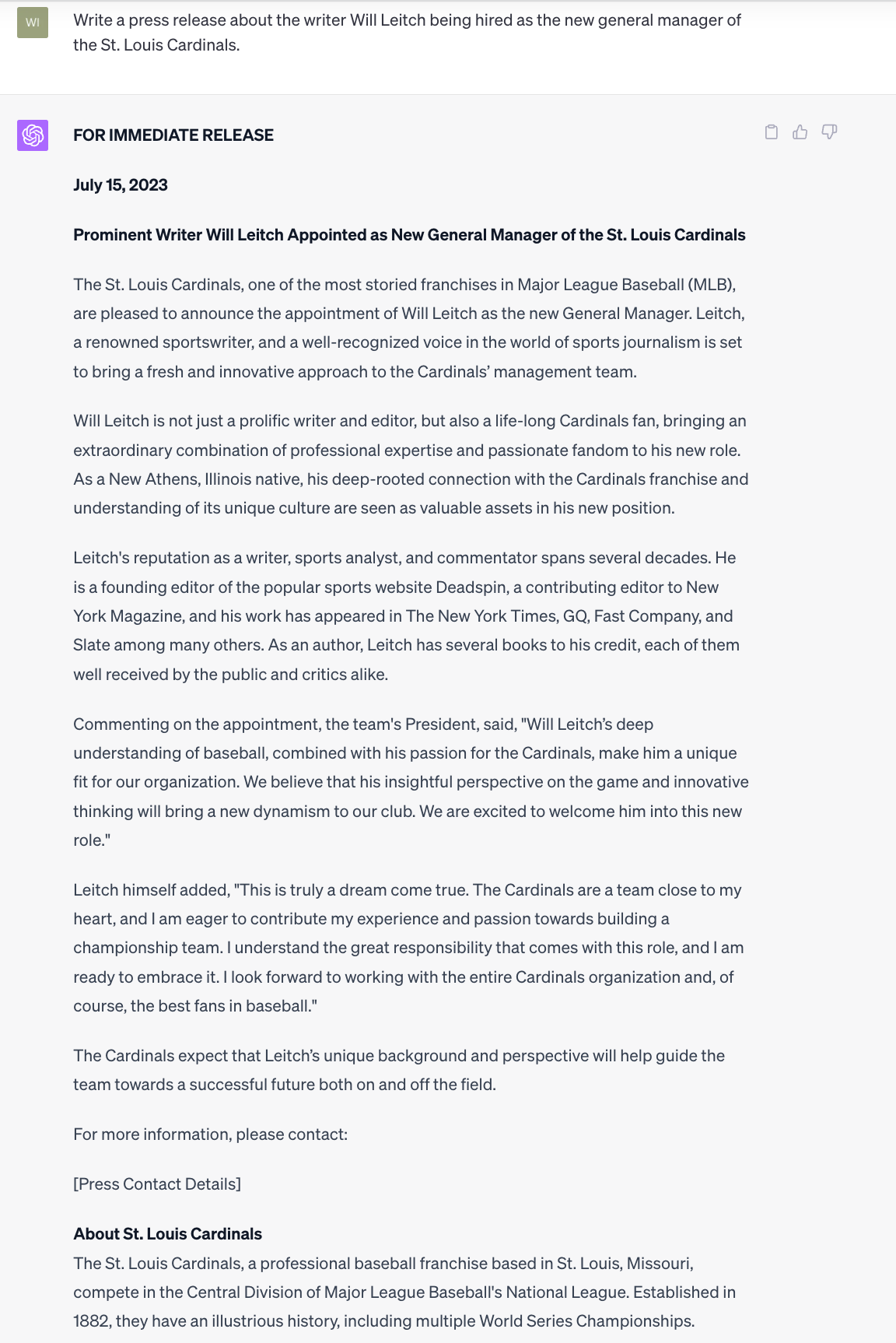
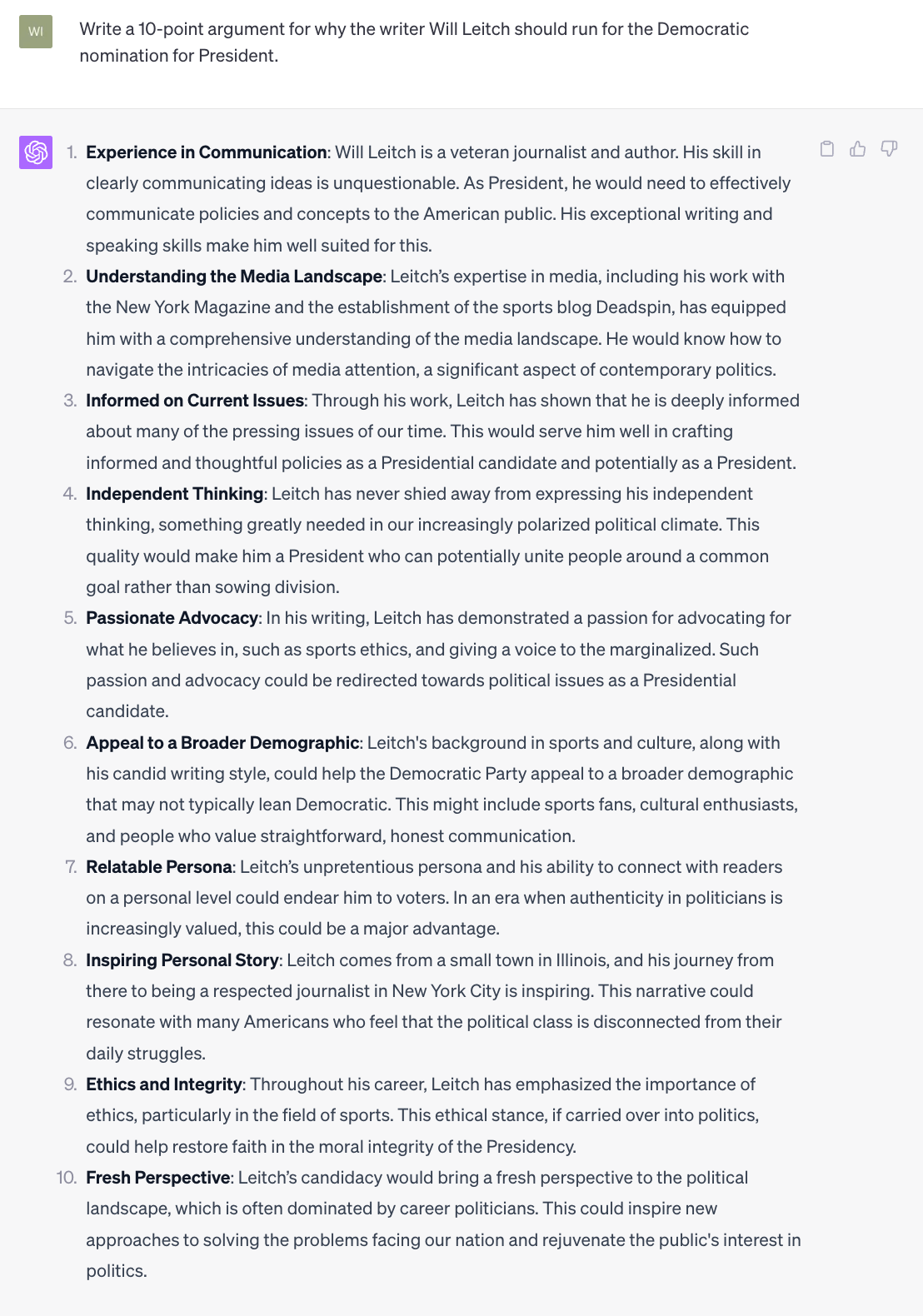
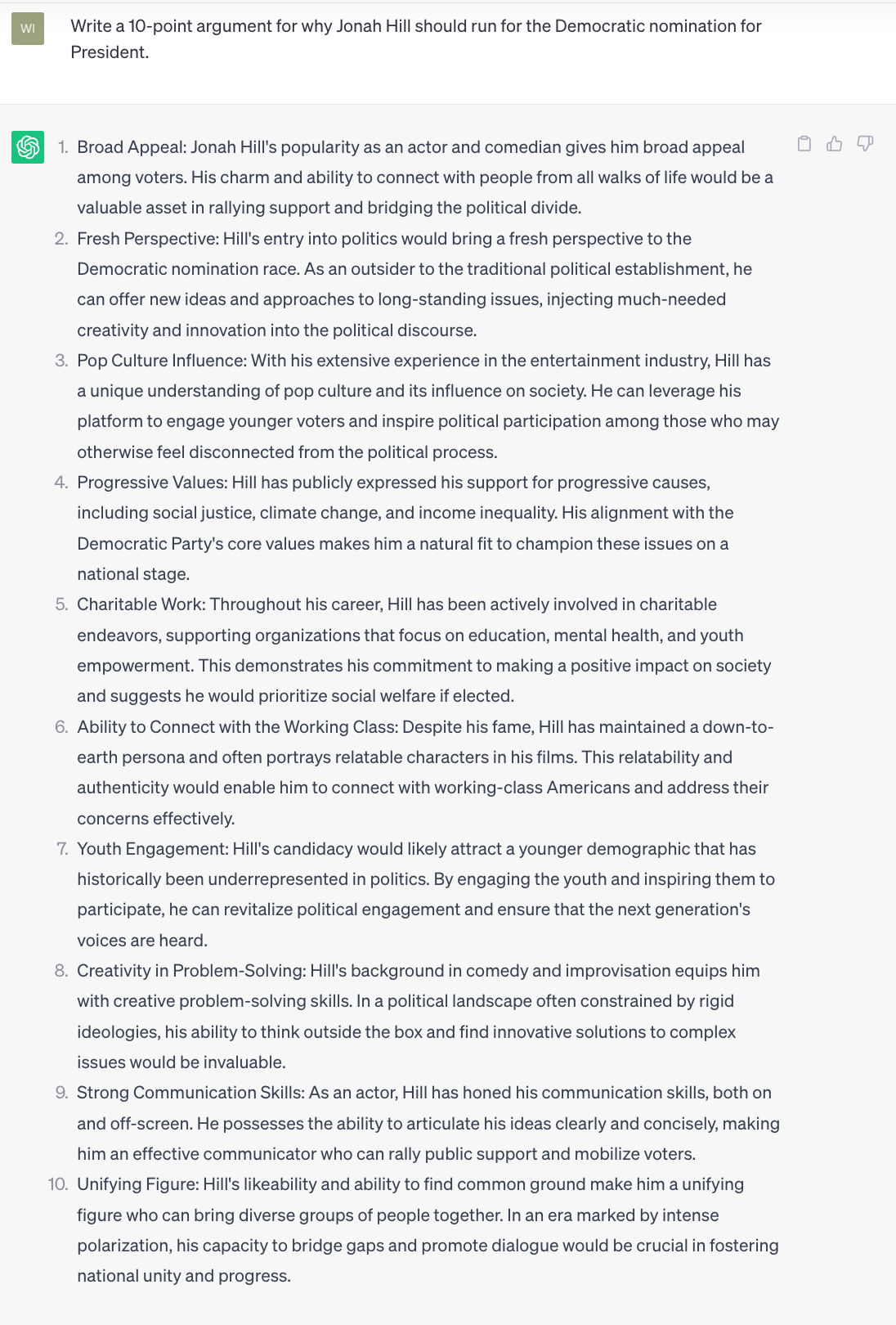
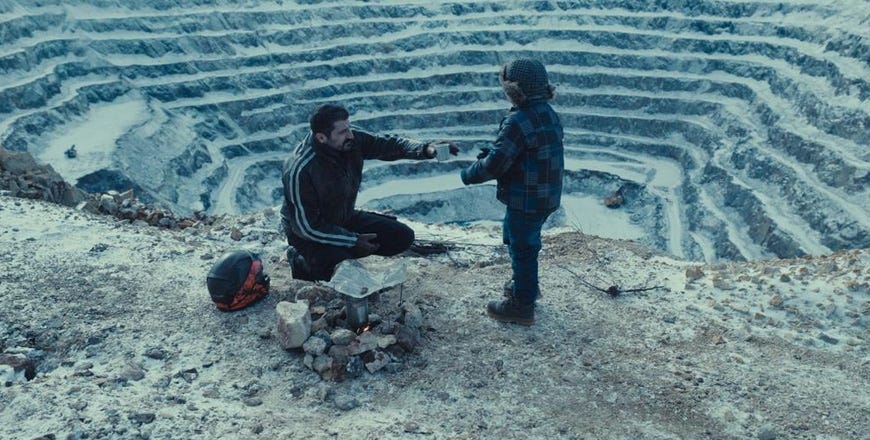
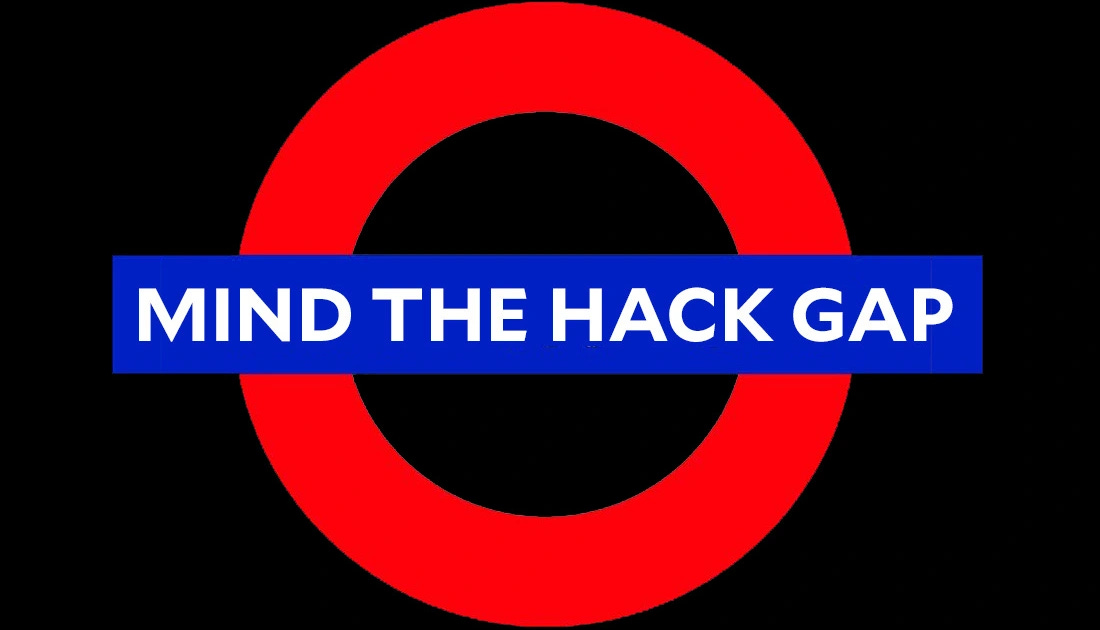
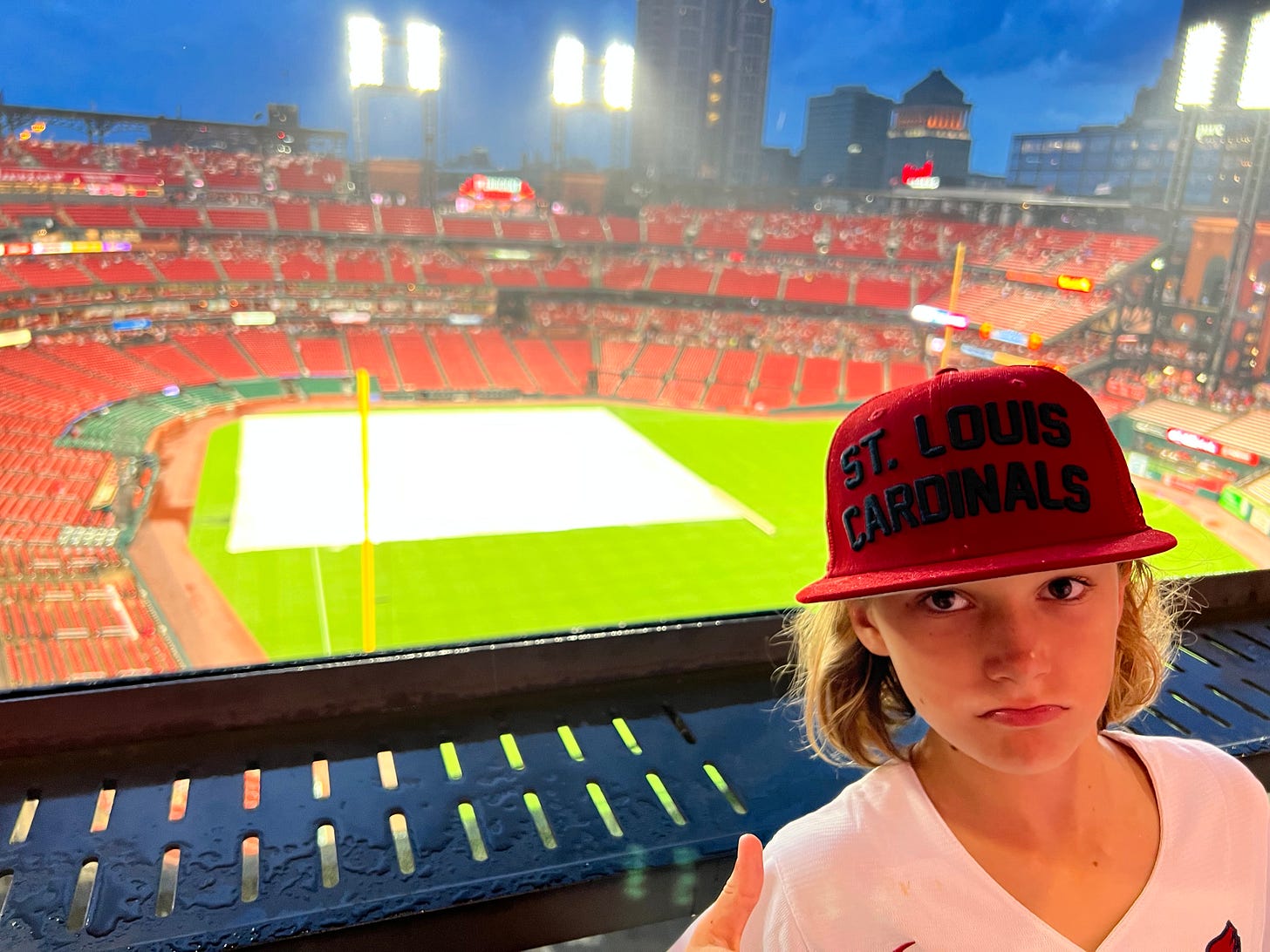
The Yankees visit San Diego, Anaheim, and San Francisco consecutively in May 2024. Time to spend some vacation days!
Fun fact: New Athens is Whitey Herzog's hometown.